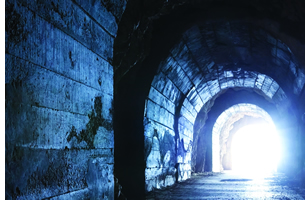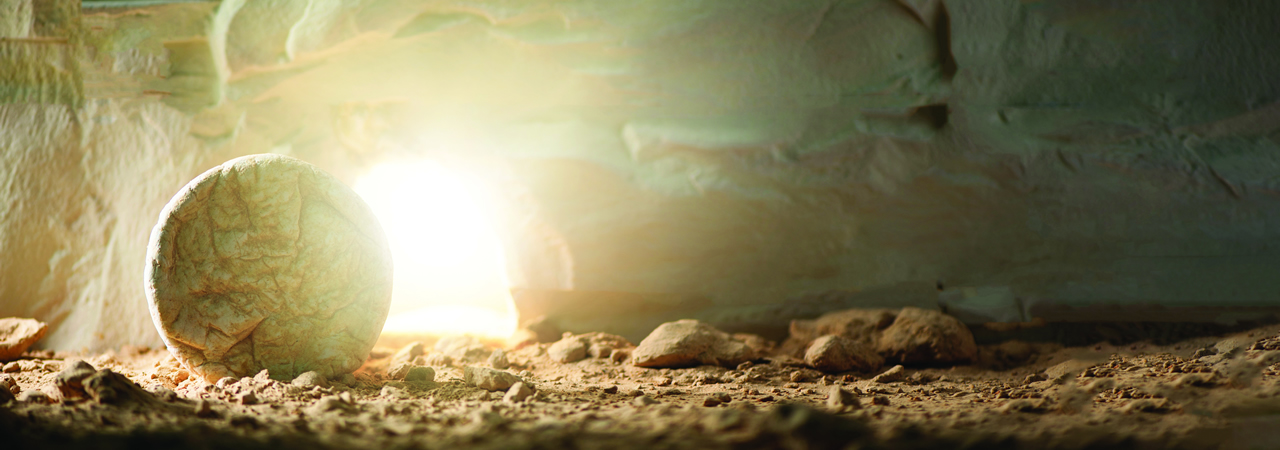Why the Resurrection?
Christ conquered death for us through His resurrection. This miracle of deliverance has far-reaching consequences for our life, even into eternity, when we accept it in faith. A biblical encouragement.
 The Lord Jesus’ bodily resurrection is a reality, and it answers many of life’s essential questions. His resurrection sheds light on the darkness that engulfs us. This is seen especially clearly through the account of the resurrection in John 20.
The Lord Jesus’ bodily resurrection is a reality, and it answers many of life’s essential questions. His resurrection sheds light on the darkness that engulfs us. This is seen especially clearly through the account of the resurrection in John 20.
The resurrection puts an end to hopelessness.
“Now the first day of the week Mary Magdalene went to the tomb early, while it was still dark, and saw that the stone had been taken away from the tomb” (John 20:1).
We humans always seem to bump against the wall of our limitations. In the Gospel of Mark, the women ask, “Who will roll away the stone from the door of the tomb for us?” (Mark 16:3). Despite our progress, developments, and ingenuity, we’re all in the same position as far as death is concerned. It is insurmountable, and we are hopeless.
The February 2021 issue of Migros Magazine interviewed psychoanalyst Peter Schneider and author Andrea Schafroth about their book Jungbleiben ist auch keine Lösung (“Staying Young Isn’t the Solution, Either”). Their conclusion sounds hopeless, even though it’s presented humorously. Using multiple techniques, the authors arrive at the following points: Ultimately, some ailments have no hope of a cure.—Health in particular is something that you will lose.—You know it isn’t really getting better, but it’s definitely getting worse.—Age-related problems are nothing more than dying in installments.—Assisted living facilities are a kind of in-between world; a lobby where people wait for their appointment with death.—Most people are afraid of dying, and are tormented by the question of what’s coming next or whether they’ve found the meaning of life.
So much for “Staying Young Isn’t the Solution, Either.” Israeli satirist Ephraim Kishon said of dying, “I don’t feel old because I’ve got so many years behind me, but because there are so few years ahead of me.” He means to be humorous, but it bears witness to the tragedy and disappointment of wanting to live and not being able to. As Woody Allen once said, “I’m not afraid of death; I just don’t want to be there when it happens.”
Throughout mankind’s history, there has never been a greater sense of helplessness and hopelessness than when facing death. A doctor’s tombstone is said to have read, “Here lies my dear husband Dr. Grimm; and all he healed lie next to him.”
Death is the great stumbling block that everyone will trip over. All except one: Jesus! “Who will roll away the stone from the door of the tomb for us?” He has the power and removes the stone from us: the stone of hopelessness, fear, oppressive guilt, and everything that weighs us down apart from God.
What man longs for most is an eternal, carefree life. That is precisely what God gives. The resurrected Jesus is the answer. The stone has been removed; the way to resurrection is free—“who has saved us and called us with a holy calling, not according to our works, but according to His own purpose and grace which was given to us in Christ Jesus before time began, but has now been revealed by the appearing of our Savior Jesus Christ, who has abolished death and brought life and immortality to light through the gospel” (2 Tim 1:9-10).
The resurrection puts an end to works-based righteousness.
“Then Simon Peter came, following him, and went into the tomb; and he saw the linen cloths lying there, and the handkerchief that had been around His head, not lying with the linen cloths, but folded together in a place by itself” (John 20:6-7).
At a funeral, the head of the deceased was wrapped in a face cloth. This cloth is a symbol of work, toil, struggle, and exertion. After the fall, God said to Adam, “In the sweat of your face you shall eat bread till you return to the ground, for out of it you were taken; for dust you are, and to dust you shall return” (Gen 3:19). Our life is toil, work, exertion, and in the end, we die. The Lord Jesus’ face cloth was folded up and lying in a special place. This is telling us that the cloth has been laid aside and the work completed; that He has done every work for us and fulfilled the law. We don’t go to heaven by merit of our own achievements, but by what Jesus has done for us. He took the sin upon Himself. And when He had finished the work, He said, “It is finished” (John 19:30).
Some lifeguards will wait until a drowning person has run out of strength and stopped fighting them, before grasping them and getting them to safety. God saved us in the same way: “who has saved us and called us with a holy calling, not according to our works, but according to His own purpose and grace which was given to us in Christ Jesus before time began” (2 Tim 1:9). “Therefore we conclude that a man is justified by faith apart from the deeds of the law” (Rom 3:28).
In an issue of Our Daily Bread, Anne Cetas wrote: “The way the word righteousness is pictured in the Chinese language is helpful. It is a combination of two characters. The top word is lamb. The bottom word is me. The lamb covers or is above the person. [. . .] Jesus, the Lamb, sacrificed Himself and shed His blood. He became our ‘cover.’ He makes us righteous, which places us in right relationship with God. Being right with God is a gift from Him. Jesus, the Lamb, is God’s way to cover us.” Because I wanted to be certain this was truly the case, I asked a Chinese Christian friend about it. She replied, “Yes, that’s true. ‘Righteousness’ consists of two parts. The upper part is ‘sheep,’ and the lower part is ‘me.’ If anyone wants to be righteous, he has to say, ‘I need the lamb.’”
Our only hope for heaven is Jesus’ merit, which He bestows upon us. Through Him, we are welcomed by God with open arms.
I read a story of a man who had been keeping an eye on a lamb that looked severely disabled. It had shaggy, matted fur and what appeared to be six legs (two of which hung lifelessly at the back, flopping with each step). But the truth behind the pitiful sight was something else entirely. One lamb had been bitten by a snake and died. Another lamb had no mother. The shepherd had the idea of skinning the dead lamb and laying its hide over the orphaned lamb. After doing so, he led this pathetic-looking orphan to the ewe that had lost her lamb. She accepted it in place of her own, because of the smell of its fur.
The resurrection puts an end to weeping.
“But Mary stood outside by the tomb weeping, and as she wept she stooped down and looked into the tomb. And she saw two angels in white sitting, one at the head and the other at the feet, where the body of Jesus had lain. Then they said to her, ‘Woman, why are you weeping?’ She said to them, ‘Because they have taken away my Lord, and I do not know where they have laid Him’” (John 20:11-13).
It’s said that the average person produces between 60 and 80 liters (15 to 20 gallons) of tears during their lifetime. Women cry between 30 and 64 times per year, and men between 6 and 17. How many tears has our world seen throughout its history? Tears of sadness, horror, suffering, pain, injustice, war, disease, jealousy, anger, rage. Weeping eyes of inconsolable children, desperate women, and horrified men.
After a tear has evaporated, salt crystals remain. According to Dr. Werner Gitt, every tear crystal contains the microscopic image of a cross. Tears are often an expression of sadness and despair, as well as of heartache. There is a secret heartache that is a hidden longing for Jesus. This is what Mary expresses: “They have taken away my Lord, and I do not know where they have laid Him.”
 Did they take Jesus away from you? Those who live apart from Jesus are unconsciously longing for Him. The Bible says, “And God will wipe away every tear from their eyes; there shall be no more death, nor sorrow, nor crying. There shall be no more pain, for the former things have passed away” (Rev 21:4). And when God wipes away your tears, it’s once and for all.
Did they take Jesus away from you? Those who live apart from Jesus are unconsciously longing for Him. The Bible says, “And God will wipe away every tear from their eyes; there shall be no more death, nor sorrow, nor crying. There shall be no more pain, for the former things have passed away” (Rev 21:4). And when God wipes away your tears, it’s once and for all.
The resurrection puts an end to seeking.
“Now when she had said this, she turned around and saw Jesus standing there, and did not know that it was Jesus. Jesus said to her, ‘Woman, why are you weeping? Whom are you seeking?’ She, supposing Him to be the gardener, said to Him, ‘Sir, if You have carried Him away, tell me where You have laid Him, and I will take Him away.’ Jesus said to her, ‘Mary!’ She turned and said to Him, ‘Rabboni!’ (which is to say, Teacher)” (John 20:14-16).
 Every person is searching for life. Aren’t many addictions just an expression of this search? Some weep pillows full of tears of longing and despair. “By night on my bed I sought the one I love; I sought him, but I did not find him” (Song 3:1).
Every person is searching for life. Aren’t many addictions just an expression of this search? Some weep pillows full of tears of longing and despair. “By night on my bed I sought the one I love; I sought him, but I did not find him” (Song 3:1).
Many aren’t finding Him because they have the wrong impression of Jesus. Mary thought He was the gardener. What do you think about Him? His biography is unique, incomparable, and at the same time, an invitation to live. When He reveals Himself to you and speaks to you personally, you have found the One you’re longing for. And when you have found Him, you’ll simply be in awe. Then you’ll recognize who He is, what He means to you, and what you have in Him. You will know that you have been cared for and loved. You’ll discover that Jesus is far more than what you’d thought of him, just as Mary did in her encounter with the supposed gardener. He is the Teacher, who fills your emptiness with His teaching.
An old man once said, “It took me 42 years to learn three things: first, that I was a lost sinner; second, that there was nothing I could do to be saved; and third, that the Lord Jesus did everything for me to be saved.”
A professor was once asked to name his greatest discovery. He replied, “My greatest discovery was Jesus Christ!”
The resurrection puts an end to uncertainty.
“Jesus said to her, ‘Do not cling to Me, for I have not yet ascended to My Father; but go to My brethren and say to them, “I am ascending to My Father and your Father, and to My God and your God”’” (John 20:17).
Gabriel Marcel was a French philosopher born in 1889. On his 40th birthday (March 5, 1929), his diary records: “I have no more doubts. This morning’s happiness is miraculous. For the first time I have clearly experienced grace. A terrible thing to say, but so it is. I am hemmed in at last by Christianity—in, fathoms deep. Happy to be so!” (from Being and Having).
People grasp at certainty. What certainty do you have? Finances? Paul writes, “But we have this treasure in earthen vessels…” (2 Cor 4:7). The jar—our body—is earthly and fragile, unlike the treasure that God has placed in us. That treasure is heavenly and unbreakable. Through faith in His Son, God places an imperishable treasure in our mortal life. This is the bright light of the knowledge of God through Jesus Christ (2 Cor 4:6), the rebirth as an imperishable seed (1 Pet 1:23). What certainty God’s Word conveys through Jesus! He ascended into heaven to God the Father, whereupon He also became God the Father.
Some say, “Nothing’s certain except death and taxes.” But that’s only partly true: “These things I have written to you who believe in the name of the Son of God, that you may know that you have eternal life, and that you may continue to believe in the name of the Son of God” (1 John 5:13). This is the end of all uncertainty and ambiguity. No religion provides absolute certainty, but God the Father does.
The resurrection puts an end to fear.
“Then, the same day at evening, being the first day of the week, when the doors were shut where the disciples were assembled, for fear of the Jews, Jesus came and stood in the midst, and said to them, ‘Peace be with you’” (John 20:19).
Any place the risen Lord enters with His peace, fear must depart. His peace penetrates the midst of fear. “There is no fear in love; but perfect love casts out fear” (1 John 4:18a).
Fear accompanies us throughout our lives. It’s as much a part of us as the air we breathe. Reinhold Ruthe writes, “Fear is like a predator attacking me. It’s like a wave overtaking me. Like a tornado racing toward me.”
Jesus said that people’s fear of what’s to come upon the world will increase (Luke 21:26). Just think of the coronavirus, which terrified the whole world. But there are so many other fears: existential fears, fear of dying, fear about the future… What comes next? What will happen to my family? What are we up against? The fear of being alone, of old age, of judgment. But through Jesus—who arose and ascended into heaven—we have the Holy Spirit to rule the fear in our hearts. When He enters our lives, the depths are filled with the glory of His love.
The resurrection puts an end to emptiness.
“And when He had said this, He breathed on them, and said to them, ‘Receive the Holy Spirit’” (John 20:22).
Well-known tennis player Ivan Lendl said during a conversation, “I’m afraid to look deep inside myself because there might be nothing there…” And famous French philosopher Albert Camus wrote: “To lose one’s life is no great matter; when the time comes I’ll have the courage to lose mine. But what’s intolerable is to see one’s life being drained of meaning, to be told there’s no reason for existing. A man can’t live without some reason for living.” Various activities exist to fill your life: sports, yoga, hobbies, magazines, books. Yet we soon find that the life we’re longing for remains an illusion. The things the world has to offer don’t afford a truly fulfilled and meaningful life, but are like mirages in the desert.
I love the devotions by psychotherapist Reinhold Ruthe. In one passage, he writes: “Atheists say life is pointless; nihilists say that life is meaningless; pessimists say that life is useless; the indifferent say that faith is irrelevant. But Christians say, ‘We’re living a new life.’”
The following passage from the Gospel of John moves me again and again: “Jesus answered and said to her, ‘Whoever drinks of this water will thirst again, but whoever drinks of the water that I shall give him will never thirst. But the water that I shall give him will become in him a fountain of water springing up into everlasting life’ […] The woman then left her waterpot, went her way into the city, and said to the men, ‘Come, see a Man who told me all things that I ever did. Could this be the Christ?’” (John 4:13-14, 28-29).
Jesus gives us a full life. In Jesus, we no longer have a past, only a future. Jesus is life. He offers us life and fills us with life: with spiritual life and a rebirth that extends into life everlasting.
The resurrection puts an end to doubt.
“Then He said to Thomas, ‘Reach your finger here, and look at My hands; and reach your hand here, and put it into My side. Do not be unbelieving, but believing.’ And Thomas answered and said to Him, ‘My Lord and my God!’ Jesus said to him, ‘Thomas, because you have seen Me, you have believed. Blessed are those who have not seen and yet have believed’” (John 20:27-29).
Mark Zuckerberg once said, “The biggest risk is not taking any risk.” Many are afraid to trustingly place their lives into the hands of the risen Lord, and they don’t realize what they’re losing. They doubt, and doubts often lead to despair. But whoever accepts the challenge will have cause for worship. He will exclaim, “How could I ever have doubted?!”
Thomas doubted, until the moment he personally encountered the risen Lord. Then he experienced a complete about-face. He recognized that Jesus is the true Son of God, and therefore God. Our thirst won’t be quenched at the mirages, but only at the source of life itself. All our doubts will only cease with the One who is the truth.
Jesus is also challenging you personally: “Come and see! Don’t be an unbeliever, but a believer!” If life is inviting you, seize the opportunity!
Midnight Call - 03/2024


